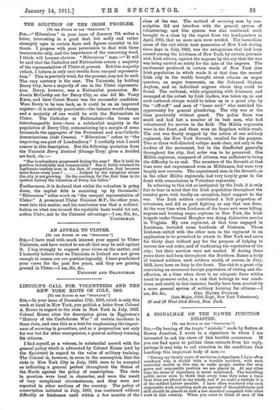LINCOLN'S CALL FOR VOLUNTEERS AND THE NEW YORK RIOTS OF
JULY, 1863.
[To THE EDITOR OP THE "SPECTATOR."] Sin,—In your issue of December 17th, 1910, which is only this week at hand in New York, you publish a letter from Colonel A. Keene in regard to the riots in New York in July, 1863. Colonel Keene cites the description given in Eggleston's "History of the Confederate War" of certain incidents in these riots, and uses this as a text for emphasising the import- ance of securing in peacetime, and as a preparation not only for war but for other emergencies, a general military training for citizens.
I find myself, as a veteran, in substantial accord with the general policy which is advocated by Colonel Keene (and by the Spectator) in regard to the value of military training. The Colonel is, however, in error in the assumption that the riots in New York City in July, 1863, were to be accepted as indicating a general protest throughout the States of the North against the policy of conscription. The riots in question were local in character, and were the result of very exceptional circumstances, and they were not repeated in other sections of the country. The policy of conscription initiated in July, 1863, was continued without difficulty or hindrance until within a few months of the
close of the war. The method of securing men by con- scription did not interfere with the general system of volunteering, and this system was also continued until brought to a close by the report from the headquarters in April, 1865, that no more men were needed. The immediate cause of the riot which took possession of New York during three days in July, 1863, was the antagonism that had been caused among the Irishmen of New York, by certain journals
with Irish editors, against the negroes by the cry that the war was being carried on solely for the sake of the negroes. The
excitement produced in certain wards of New York (the Irish population in which made it at that time the second Irish city in the world) brought about attacks on negro quarters, on negro tenements, on the Coloured Orphan Asylum, and on individual negroes where they could be found. The outbreak, while originating with Irishmen, and managed at the outset by Irish leaders, was taken up, as any such outbreak always would be taken up in a great city, by the " riff-raff " and men of "baser sort," who snatched the opportunity for general plundering. The city was at the time practically without guard. The police force was small and had lost a number of its best men, who had volunteered for service in the field. The Militia regiments were in the front, and there were no Regulars within reach, The riot was finally stopped by the action of one military regiment, the New York Seventh, recalled for the purpose.
Two or three well-directed volleys made clear, not only to the leaders of the movement, but to the disaffected generally throughout the city, that order was to be preserved. One Militia regiment, composed of citizens, was sufficient to bring the difficulty to an end. The members of the Seventh at that time were not experienced even as Militiamen, but were very largely new recruits. The experienced men in the Seventh, as hi the other Militia regiments, had very largely gone to the front with commissions in Volunteer regiments.
In referring to this riot as instigated by the Irish, it is only fair to bear in mind that the Irish population throughout the country gave, with hardly an exception, loyal support to the war. Our Irish settlers contributed a full proportion of volunteers, and did as good fighting as any that was done. At the very time when Irishmen of the baser sort were killing negroes and burning negro asylums in New York, the Irish brigade under General Meagher was doing distinctive service in Virginia. My own regiment, at that time engaged in Louisiana, included some hundreds of Irishmen. These Irishmen united with the other men in the regiment in an application to be permitted to return to New York and serve for thirty days without pay for the purpose of helping to restore law and order, and of vindicating the reputation of the city; but their services were not needed. If during these years there had been throughout the Northern States a body
of trained soldiers, such soldiers would, of course, in July, 1863, have been on duty in the front. The risk to a great city
containing an enormous foreign population of rioting and dis- affection, at a time when there is no adequate force within reach to preserve order, is a risk that belongs to war condi- tions, and could, in this instance, hardly have been averted by a more general system of military training for citizens.—I
(late Major, 176th Kee., New York Volunteers). 27 and 29 West 23rd Street, New York.






































 Previous page
Previous page